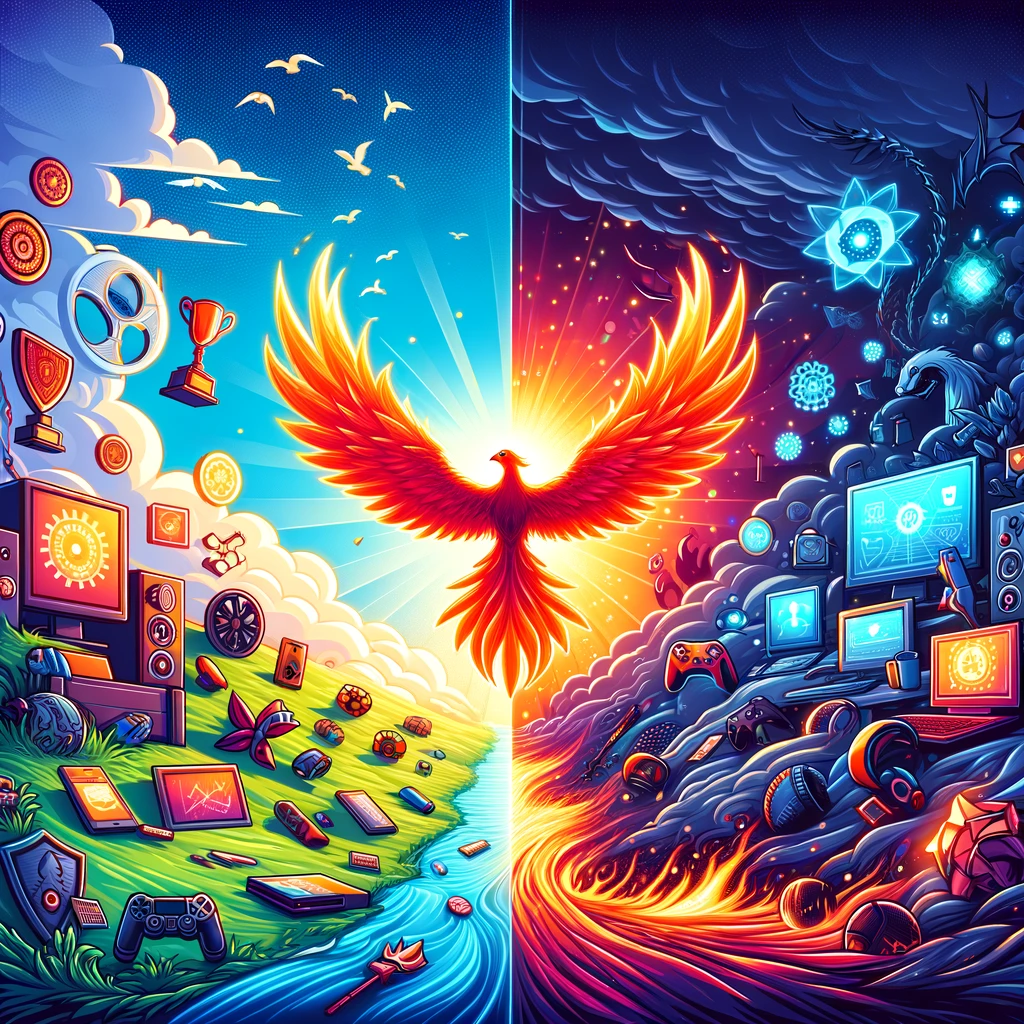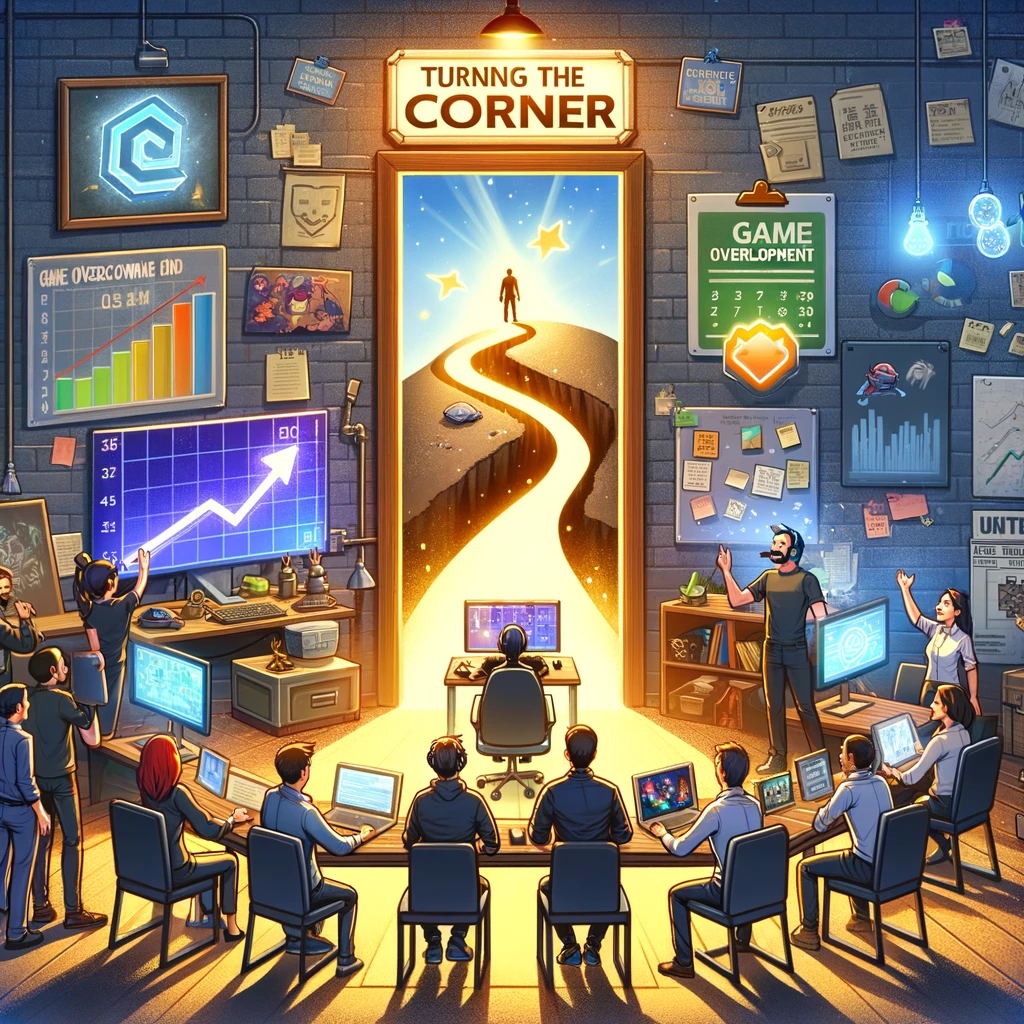The Lifecycle of Gaming Studios: From Rise to Reinvention

The gaming industry, a vibrant and ever-evolving landscape, has seen many studios rise to fame, only to face challenges that test their resilience and adaptability. This article delves into the journeys of four prominent studios—Electronic Arts (EA), Ubisoft, Bethesda Game Studios, and Nintendo—exploring their beginnings, cultural shifts, growth strategies, and how they’ve navigated periods of decline and reinvention. We’ll also draw correlations with regular tech companies, particularly in light of recent layoffs, to understand how we can predict and prepare for the future.
Foundations and Early Culture
- Electronic Arts (EA) was founded in 1982 by Trip Hawkins, with a vision to produce and publish software for personal computers. Initially, EA distinguished itself by giving game designers recognition, akin to authors or music artists, fostering a culture of creativity and innovation.
- Ubisoft started in 1986 by the five Guillemot brothers in France. The company’s early culture was marked by a spirit of entrepreneurship and a willingness to take risks, which propelled its growth and expansion into the global market.
- Bethesda Game Studios, established in 1986, initially thrived on the creativity and vision of its founder, Christopher Weaver. The studio gained fame with its Elder Scrolls series, emphasizing open-world gameplay and player freedom.
- Nintendo, founded in 1889, initially produced handmade playing cards. It pivoted to video games in the 1970s under the leadership of Hiroshi Yamauchi. Nintendo’s culture has always emphasized fun, innovation, and quality, which has been key to its enduring success.
Growth, Peak, and Cultural Shifts
As these studios grew, their cultures evolved. EA and Ubisoft expanded through acquisitions, which sometimes led to challenges in integrating diverse studio cultures into their broader corporate ethos. Bethesda and Nintendo, while less aggressive in acquisitions, faced their own challenges in maintaining their unique cultures amid rapid growth and industry changes. EA and Ubisoft, in particular, faced criticism for fostering “crunch culture” and not adequately addressing workplace issues. In response, both companies have taken steps to improve their workplace environments and ensure more inclusive and respectful cultures. Nintendo’s consistent focus on innovation and quality has helped it maintain a strong and positive company culture, even as it has grown into a global powerhouse. Bethesda’s culture has been challenged by the mixed reception of recent titles and the need to innovate while staying true to its roots.

Facing Decline
EA, or Electronic Arts, is one of the largest and most influential gaming companies in the world, with franchises such as FIFA, The Sims, and Battlefield However, the company has also faced backlash for its focus on microtransactions and “live service” models, which many saw as prioritizing profits over player experience For example, Star Wars Battlefront II sparked controversy for its loot box system, which was widely criticized as pay-to-win and gambling The company has also been accused of neglecting some of its popular series, such as Mass Effect and Dragon Age, and shutting down some of its beloved studios, such as BioWare and Visceral Games
Bethesda Game Studios, known for its iconic titles such as The Elder Scrolls and Fallout series, has had a significant impact on the gaming industry However, in recent years, the studio has faced criticism for the declining quality of its games. Some gamers have expressed dissatisfaction with the studio’s slower release schedule and perceived decrease in game quality For instance, Redfall received disappointing reviews, putting pressure on the upcoming game Starfield There’s also a sentiment that Bethesda’s open-world games have been outpaced by competitors in terms of production quality, combat, graphics, and gameplay systems
Ubisoft, on the other hand, has been a leader in the gaming industry with franchises such as Assassin’s Creed, Far Cry, and Tom Clancy’s series However, the company has also faced challenges. Ubisoft’s shares fell significantly in early 2023 due to a warning on revenue and the postponement of the game “Skull and Bones”. The company has also been criticized for its current trajectory, with some suggesting it is in decline.
Nintendo, on the other hand, is a gaming giant that has been synonymous with innovation and creativity, with franchises such as Mario, Zelda, and Pokemon However, the company experienced a slump with the Wii U, which was a commercial failure and received mixed reviews from critics and gamers The Wii U suffered from a lack of third-party support, a confusing marketing strategy, and a weak hardware performance The company rebounded strongly with the Nintendo Switch, which was a huge success and received acclaim for its hybrid design and diverse library of games The Switch also showcased Nintendo’s ability to reinvent its classic franchises, such as Breath of the Wild, Super Mario Odyssey, and Animal Crossing: New Horizons
Several factors can contribute to a studio’s decline after producing hit games:
- Repetitive and Stale Content: A studio may face pressure to release new games frequently to maintain revenue and player interest. Over time, companies may struggle to keep their content fresh and engaging, leading to a decline in quality.
- Competition: As the gaming industry evolves, studios must keep up with new technologies, gameplay mechanics, and player expectations. Failure to innovate or adapt can lead to a studio being outpaced by its competitors.
- Financial Pressure: As publicly traded companies, game companies are under pressure to deliver predictable revenue. This can lead to decisions that prioritize monetization over game quality, such as the inclusion of pay-to-win elements.
- Chasing Trends: Companies may push developers to create games that follow current trends, even if these are outside their areas of expertise. This can lead to games that are of lower quality or that do not resonate with the company’s core audience.
- Management Decisions: Decisions made by the studio’s management can significantly impact its trajectory. This includes decisions about game development, release schedules, and responses to criticism.
In conclusion, while producing hit games can bring success and recognition to a gaming studio, it doesn’t guarantee continued success. Studios must balance the need to innovate and maintain high-quality game development with the financial and competitive pressures of the gaming industry.
The Impact of “Hire-and-Fire” Cycles
The constant exchange of workers in the gaming industry, often referred to as the “hire-and-fire” cycle, can indeed impact the quality of a game series. This practice involves laying off workers after a game is completed and then hiring new ones when a new game is in development. While this approach might seem cost-effective in the short term, it can have several negative impacts on the quality of games produced.
Firstly, high turnover rates can lead to a loss of institutional knowledge and talent, creating a sense of instability within the organization. When experienced employees leave, they take with them their understanding of the company’s processes, culture, and past projects. This can lead to a loss of continuity and consistency in the game series, potentially resulting in a decline in quality.
Secondly, the constant hiring and firing can negatively impact employee morale and engagement. This can lead to a decrease in productivity and work quality, as employees may feel insecure about their job stability and thus be less motivated to perform at their best.
Thirdly, the training of new employees can be costly and time-consuming. It can take a new hire one to two years to reach the productivity of an existing employee. During this period, the quality of work may not be as high as that of an experienced employee, which can affect the quality of the game being developed.
On the other hand, retaining quality workers can have several benefits. Long-term employees are more likely to understand the company’s culture and processes, which can lead to more efficient work and higher quality output. They can also build stronger relationships with customers and colleagues, which can improve collaboration and innovation.
Furthermore, companies that invest in their employees through competitive compensation, opportunities for growth, and a positive work environment are more likely to retain their top talent.
In conclusion, while the “hire-and-fire” cycle might seem cost-effective in the short term, it can lead to a decline in the quality of a game series over time. Retaining quality workers, on the other hand, can contribute to the consistency and improvement of a game series.

Turning the Corner
Creating a company culture that encourages management to work for the collective good rather than for individual gain is a multifaceted challenge, especially in environments that traditionally focus on individual achievement. However, there are strategies that companies can employ to foster a more collaborative and inclusive culture.
-
Leadership and Role Modeling: Leadership plays a critical role in setting the tone for company culture. When leaders model behavior that prioritizes the company’s collective success over individual accolades, it can set a precedent for management to follow. Leaders should demonstrate commitment to the company’s values and mission, and show how individual success is tied to the company’s overall performance.
-
Aligning Incentives with Company Goals: Incentives can be powerful motivators for behavior. By aligning incentives with long-term company goals and team performance rather than individual short-term achievements, companies can encourage managers to focus on what’s best for the organization as a whole. This might include bonuses based on team achievements, company-wide performance, or contributions to innovation and collaboration.
-
Fostering a Collaborative Environment: A collaborative work environment that values teamwork, open communication, and collective problem-solving can encourage managers to work together for the benefit of the company. This can be achieved by promoting diversity and inclusion, investing in team-building activities, and recognizing and rewarding teamwork.
-
Continuous Learning and Development: Investing in the continuous learning and development of employees can create a culture of growth and improvement that benefits the entire company. When managers see the company investing in their skills and career development, they may be more likely to reciprocate by working towards the company’s long-term success.
-
Ethical and Transparent Practices: Ethical behavior and transparency in decision-making can build trust and encourage managers to act in the best interests of the company. This includes open communication about company challenges and successes, as well as a clear and fair process for decision-making.
-
Nudge Theory: Nudge theory suggests that subtle changes in the environment can influence behavior in a non-coercive way. Companies can use this approach to gently steer managers towards behaviors that benefit the company as a whole, such as by making collaborative tools more accessible or by highlighting stories of successful teamwork.
The Role of Culture: Individual vs. Collective Success
The values of a nation can influence the culture of its companies. Japanese companies like Nintendo often emphasize harmony, respect, and continuous improvement, which are reflected in Nintendo’s approach to game development and employee relations. American companies like EA and Bethesda may reflect a more individualistic culture, focusing on innovation and competition. Ubisoft, with its French roots, combines a focus on artistic excellence with a commitment to improving workplace culture and diversity.
While national culture can influence company culture, it is possible for a company to develop its own distinct culture that emphasizes collective success. This involves consciously designing practices and rituals that reflect the company’s values and goals, and that can sometimes transcend national cultural tendencies.
In conclusion, creating a company culture that encourages management to work for the collective good involves a combination of leadership, aligned incentives, collaboration, continuous learning, ethical practices, and subtle behavioral nudges. By focusing on these areas, a company can foster a culture where the success of the individual is linked to the success of the whole, even in environments that typically emphasize individual achievement.
EA and Ubisoft have made concerted efforts to address workplace issues and refine their game development approaches. Ubisoft, for example, has focused on improving its company culture and ensuring a more inclusive and welcoming workplace. Bethesda, now under the umbrella of Microsoft, has an opportunity to refocus and innovate with the backing of a tech giant. Nintendo has continued to innovate, focusing on what it does best: creating unique gaming experiences that appeal to a broad audience.

Shining Example
Nintendo, a household name in the gaming industry, has had its share of ups and downs. In the early 1980s, the video game industry experienced a significant crash, with many companies, including Atari, facing ruin. However, Nintendo, which had been planning to offer Atari worldwide distribution rights outside Japan, saw an opportunity to compete with the diminished Atari,
Nintendo entered the U.S. market in 1985 and quickly dominated the video game world for the rest of the eighties and much of the nineties. The company’s innovative hardware and engaging games filled the void left by Atari’s collapse, demonstrating that the video game industry was not a short-lived fad but a sustainable and profitable market.
Same company in 2013, after Wii U disaster, and financial hardship for several years before release of Nintendo Switch, slashed wages of management to retain employees, who continued to make successful games.
Lessons for the Gaming Industry
The success stories offer valuable lessons for gaming companies facing similar challenges. Key strategies for navigating major transitions and recovering from declines in quality include:
- Revising Business Models: Adapting business models to align with new market trends and consumer preferences.
- Investing in New Technologies: Leveraging new technologies to enhance game quality and player experience.
- Addressing Staff Turnover: Focusing on retaining key staff and recruiting new talent to maintain continuity and institutional knowledge.
- Improving Customer Engagement: Actively engaging with customers to address their concerns and improve satisfaction.
- Expanding Demographics: Broadening the player base by targeting new demographics with diverse game offerings.
- Continuous Learning and Development: Investing in the continuous growth and development of employees to foster innovation and creativity.
Correlations with Regular Tech Companies
The gaming industry, while unique in its product offerings, shares many similarities with the broader tech industry. Both are fast-paced, innovation-driven, and subject to rapid changes in consumer preferences and technology. Here’s how the experiences of gaming studios might correlate with regular tech companies:
- Cultural Evolution: As companies grow, their cultures often shift. This can lead to challenges, such as integrating new acquisitions or maintaining core values. Tech companies, like gaming studios, must manage these shifts to prevent a dilution of their original ethos, which can impact employee satisfaction and product quality.
- Workplace Issues: The “crunch culture” and workplace misconduct issues faced by EA and Ubisoft are not unique to gaming. Tech companies are also scrutinized for their work environments. Addressing these issues is crucial for retaining talent and maintaining a positive brand image.
- Innovation vs. Profit: EA’s backlash over microtransactions mirrors a broader tech industry tension between innovation and monetization. Companies must balance the drive for profit with the need to deliver value to customers.
- Adaptation to Market Changes: Just as Nintendo pivoted after the Wii U’s slump, tech companies must be agile and responsive to market feedback to avoid obsolescence.

Strategies for Long-term Success
Drawing from the gaming studios’ experiences, here are strategies that can be applied to any tech company:
- Positive Workplace Culture: A culture that values inclusivity, respect, and engagement can improve employee morale and productivity. Regular tech companies should invest in creating such environments, especially after layoffs which can demoralize remaining staff.
- Continuous Innovation and Quality: Staying at the forefront of technology and maintaining high-quality standards are essential. This requires investment in R&D and a commitment to excellence.
- Community Engagement: Listening to customers and the community can provide insights into market needs and help in adjusting strategies accordingly.
- Flexibility and Adaptability: The ability to pivot and adapt to changes in the industry is vital. This could mean diversifying product lines, exploring new markets, or restructuring operations.
Cultivating a Company Culture for Collective Success
In conclusion, the success of a gaming studio doesn’t solely depend on producing hit games. It also depends on how the studio is managed and the culture it fosters. By focusing on collective success, long-term thinking, and the well-being of its employees, a studio can navigate the challenges of the gaming industry and set itself up for long-term success.
To prevent the decline in quality and ensure long-term success, companies should cultivate a culture that discourages short-term cycles and promotes collective success over individual gain. This involves:
- Leadership and Role Modeling: Leaders should model behavior that prioritizes the company’s collective success over individual accolades.
- Aligning Incentives with Company Goals: Incentives should be aligned with long-term company goals and team performance rather than individual short-term achievements.
- Fostering a Collaborative Environment: A collaborative work environment that values teamwork, open communication, and collective problem-solving can encourage managers to work together for the benefit of the company.
- Continuous Learning and Development: Investing in the continuous learning and development of employees can create a culture of growth and improvement that benefits the entire company.
- Ethical and Transparent Practices: Ethical behavior and transparency in decision-making can build trust and encourage managers to act in the best interests of the company.

Roots
The odysseys of EA, Ubisoft, Bethesda, and Nintendo serve as compelling narratives that chart the complexities of the gaming industry’s lifecycle. Each began as a small venture, driven by a group of passionate and talented individuals with a shared vision for creating something remarkable. These founders were not just businesspeople; they were developers, artists, and dreamers who laid the groundwork for what would become iconic pillars in the gaming world.
As these companies expanded from their humble beginnings, they encountered a myriad of challenges and opportunities that tested their adaptability and commitment to their core values. Their evolution from small teams to corporate entities sometimes led to a shift away from the very principles that originally defined them. This shift can be a pivotal moment for any company, as it may either herald a new era of innovation or signal the beginning of a decline in quality and originality.
However, it’s important to note that the success of a gaming studio doesn’t solely depend on the founders’ involvement in game development. Effective management, clear vision, quality control, and good employee relations are also crucial factors
Conclusion
The lessons gleaned from these gaming giants resonate beyond their industry, offering valuable insights for tech companies at large. The importance of nurturing a positive workplace culture, committing to continuous innovation and quality, actively engaging with the community, and maintaining flexibility in the face of change cannot be overstated.
As we reflect on the impact of layoffs and the quest for sustainable growth, it’s crucial to remember that the spirit of those small, original teams—their enthusiasm, talent, and vision—is the cornerstone upon which long-term success is built. By embracing these qualities and learning from the past, tech companies can forge a future that honors their origins while innovating for the world of tomorrow.